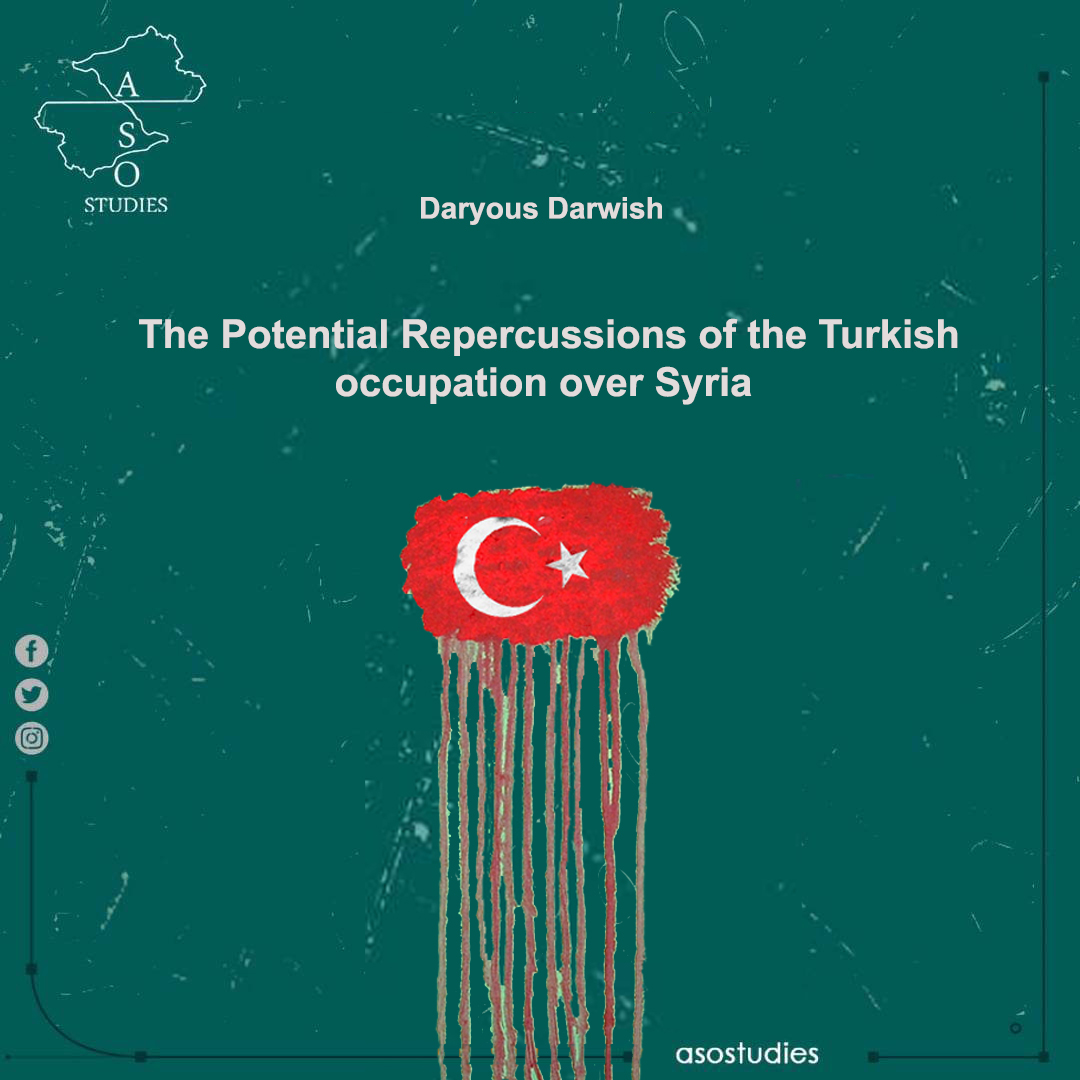The Potential Repercussions of the Turkish occupation over Syria
Daryous Darwish
Turkey seeks for expanding the occupied territories along the borders like in Afrin and Ras al Ayan which have been taken by force by the Syrian Islamic opposition factions, however, these Turkish threats have been just slogans until entering into force in 20 November and turned into aerial bombardment over the infrastructure in NES and SDF.
The Islamic extremist factions under the name of “Syrian National Army” “SNA” controlled by Turkey is considered the military wing for the land-based operations against SDF.
First, if this scenario comes true, Turkey will face a legal problem in legitimizing its continued occupation of Syrian territory. In the east of the Euphrates, Turkey relies on what it considers its right, according to the Charter of the United Nations (Article 51) and the Adana Agreement of 1998 with Assad regime, in the face of what it claims is the security threat posed by the Syrian Democratic Forces to it. On the other hand, these documents do not give Turkey the right to maintain its occupation after removing the intended threat to it. Therefore, if Turkey conducts a ground military operation that leads to the removal of the SDF from the east of the Euphrates, it will necessarily invalidate its argument of self-defense in accordance with the above-mentioned charters. It would therefore be legitimate for Russia to mediate a formal Syrian request for the evacuation of Turkish forces from the areas it occupies. This request will be in accordance with international law.
Similarly, on the other bank west of the Euphrates River, Turkey mainly counts on the 2017 Astana talks (de-escalation agreement) in order to legitimize the remaining of its troops in the Islamic opposition-controlled area in northern Syria, as a guarantor to prevent the attack of these factions on the Syrian regime forces. However, what is interesting about this formal agreement, which has not yet reduced any significant escalation by the Syrian regime against opposition areas, is that it is a restricted agreement, 6 months renewable provided that the guarantor parties agree, including Russia, which can, whenever it wants, not agree to the renewal and legally request Turkey to remove its forces within a maximum period of 6 months from the areas controlled by the Islamist opposition.
Therefore, the legitimacy of Turkish troops remaining in Syria depends on Russia's will, which is unlikely to be available after Turkey has completed its mission to eliminate the SDF. The easy and lucrative gains that the Russians have so far gained from the exchanges of (Ghouta, Homs and Aleppo) with Turkey's current spheres of influence have been obtained as a result of Turkey's differences with the SDF. Therefore, once these differences end with the end of the SDF, Turkey will have no significant role to play for Russia, not even its nominal role in curbing its Islamist forces from attacking Syrian regime forces. Because every Russian-Turkish agreement necessarily leads to the withdrawal of other areas of the Islamist factions in favor of the regime. As is the case with the rest of the exchanges between them. The Russian demand for the evacuation of Turkish troops from Syria will then be supported by the agreement signed by Turkey in Astana, and the latter will only have to implement.
The Islamist opposition may heavily rely on Turkey's strength to reject such a request from Russia, a bet on Turkey's willingness first, and second, ability to fight such a battle. But why would Turkey endure the hardship of eliminating a small threat from the SDF, only to find itself immediately afterwards in a much more dangerous and costly battle with the Syrian regime and Russia? Of course, Turkey does not lose sight of the results after its recent arrival in Syria, and has even given clear indications that it expects and accepts these results after recently stating its readiness to re-engage with the regime under the pretext of "political realism." This political realism is not new, but dates back to 2015, when it began its most important turn from the Syrian revolution and shifting its goal in Syria from toppling Assad to breaking the Kurds. Indeed, if it were to eliminate the SDF, it would have achieved everything it wanted from Syria, and a few groups of extremists, unruly and bandits would not to take any risks, small or large, in order to remain in Syria to protect and support them.
On the other hand, would Turkey dare to fight such a battle with its back exposed without any ally? In fact, it did not dare to do so in 2020, when Russian aircraft killed more than 30 Turkish soldiers in a bombing of a military patrol in Idlib. The meagre military response at the time is matched only by the meagre response of the Turkish diplomat, whose embassy tweeted last February (before later deleting its tweet) that "revenge for 34 Turkish soldiers killed by Russian forces in Idlib two years ago has now taken place in Ukraine", boasting that a few Bayraktar planes, owned and operated by the Ukrainian army, participated in the bombing of a Russian military convoy. In fact, Turkey is also very skeptical of its ability to rely on NATO support in any battle in Syria, as the alliance requires that in order to activate Article V of its treaty, the attack on the member state must have occurred within its territory and not outside it, in addition to the tense relations with the alliance since the US decision to withdraw Patriot batteries from the Turkish border in 2015, and the subsequent Turkish "turns" towards Russia and its missile system.
Pleasing Russians has always been one of Turkey's vital goals in its use of the Syrian Islamist opposition by giving it orders to withdraw from swap zones. Turkey's latest adventure is not expected to be an anomaly from al-Qaeda or to pass without similar orders to evacuate opposition-controlled areas (and possibly hand them over to HTS) or at least cut off support for them. There is no doubt that the results then will be catastrophic, not only for the Kurds and Syriacs, who will lose all the national freedom they get, and not only for the Arabs of Raqqa and Deir ez-Zor, who will become subject to the regime's revenge and Iranian militias, but also for the population in opposition-controlled areas who will find themselves alone this time without even having "luxury." The displacement and settlement of Kurdish areas, which puts them directly at the center of the massacres of Syrian and Russian aircraft, and makes them fuel for the hell of the regime's intelligence services.

